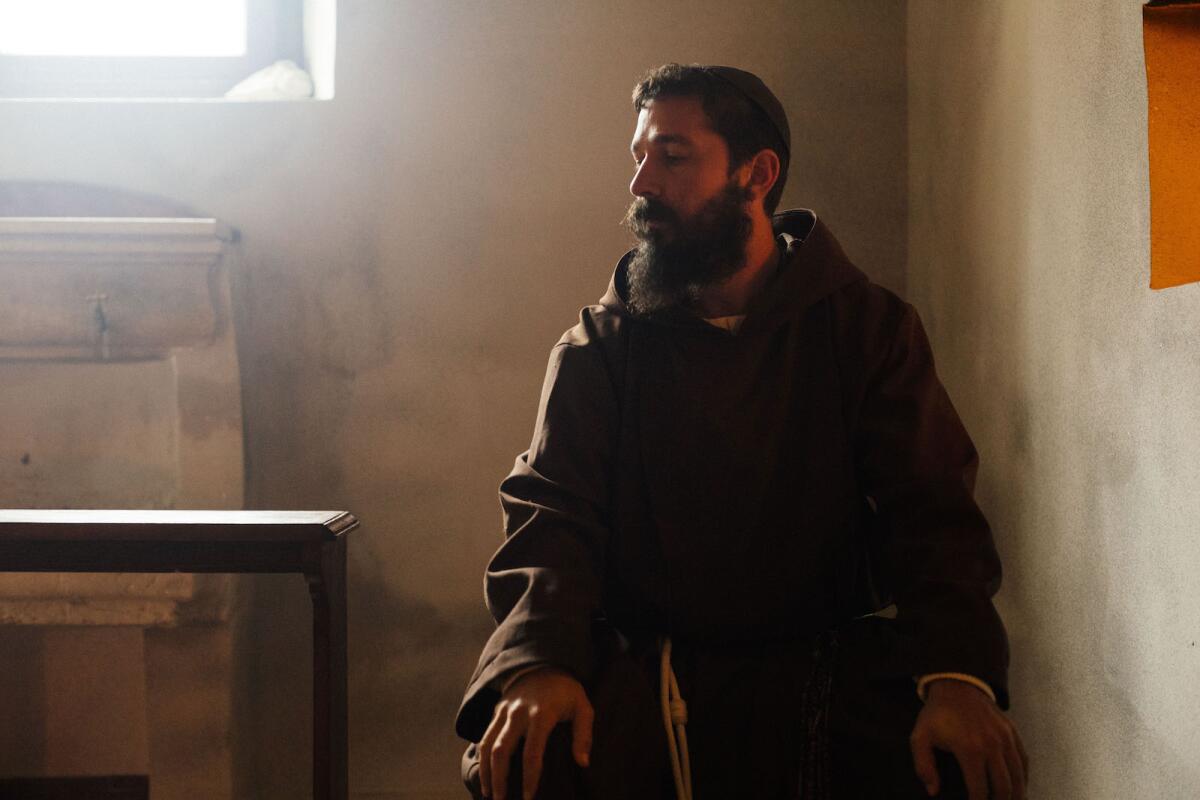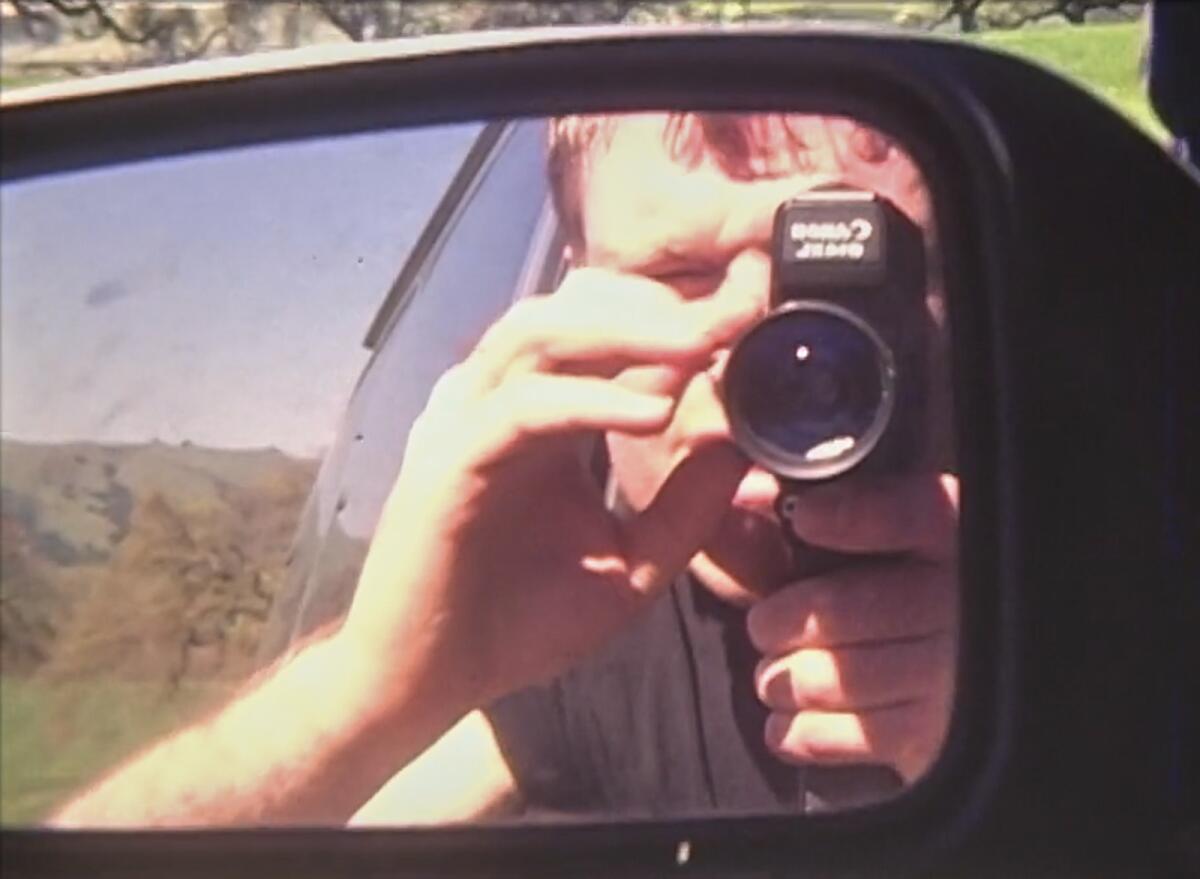Review: Shia LaBeouf stars in Abel Ferrara’s ahistorical historical drama ‘Padre Pio’

‘Padre Pio’
The offbeat historical drama “Padre Pio” bears the stamp of writer-director Abel Ferrara, a maverick filmmaker known for brutish, feverish genre pictures like “Bad Lieutenant” and “The Addiction.” As is his wont, Ferrara makes some creative choices here that may alienate some viewers. He has a cast of Italian actors speaking in heavily accented English, telling the still-relevant story of a clash between socialists and fascists in a small Italian town just after World War I. Ferrara, though, lets his star Shia LaBeouf speak with his usual American accent as the title character: a priest from that town who was later canonized as a Catholic saint.
There may be a thematic reason for the odd mix of accents, just as there may be a point to the way all the characters — including Padre Pio — speak with a very modern-sounding bluntness, peppered with profanity. Or this may just be a case of Ferrara being Ferrara, favoring plain-spoken expression, similar to the way he uses handheld cameras and natural lighting to make the world of 100 years ago look like today. Either way, these quirks demand some adjustment from the audience, especially those who come to this movie expecting a more straightforward portrait of a Catholic icon. (Ferrara, of course, mostly excludes the acts and miracles that led to Padre Pio’s ultimate veneration.)
Yet for those willing to stretch a little to connect with Ferrara, “Padre Pio” is often as rewarding as it is challenging. There’s an urgency to the two halves of this film’s narrative: in both, the scenes where ordinary people try to democratically wrest power from gun-wielding crooks and landlords as well as those where Padre Pio privately wrestles with self-doubt and desire. There’s a potent anger too in the way Ferrara keeps these halves stubbornly separate. The division is so noticeable that it serves a larger purpose: to illustrate how people too often fail to see the interconnectedness of earthly struggles and spiritual crises.
‘Padre Pio.’ R, for language, some violence and brief nudity. 1 hour, 44 minutes. Available on VOD; also playing theatrically in limited release

‘Sam Now’
As a teenager in the late 1990s, an aspiring filmmaker named Reed Harkness started making goofy, creative home movies with his younger half brother Sam, a project that took a turn a few years later when Sam’s mother and Reed’s stepmother, Jois, left town for good without telling anyone where she was going or why.
In 2003, the Harkness brothers went looking for Jois, filming their journey. A little over 15 years after that, Reed pointed his cameras at his family again to take another look at how Jois’ disappearance affected everyone’s lives and to ask whether the trip that he and Sam had made really brought closure.
The resulting documentary “Sam Now” has the basic structure of a mystery, centered on the big question of what happened to Jois. But Harkness keeps the tone gentle and reflective because he’s not looking to shock the audience. (At the risk of getting into spoiler territory, viewers should know in advance that there are no violent crimes or disturbing family secrets uncovered here.)
“Sam Now” is mostly an honest examination of some common, familiar forms of family dysfunction, such as parents keeping their hurt feelings and worries hidden from their children and how some families collectively decide it’s better to ignore a shared trauma than to acknowledge it.
This quietly powerful film is a way for Harkness to reopen some of his family’s wounds, but always with the understanding that the more he pokes and digs, the longer it may take to heal.
‘Sam Now.’ Not rated. 1 hour, 27 minutes. Available on VOD
‘Concerned Citizen’
Israeli writer-director Idan Haguel tackles identity politics and how hard it is to be a “good person” in “Concerned Citizen,” a dramedy that borders on social satire — though Haguel is ultimately too compassionate to tear anyone down.
Shlomi Bertonov plays Ben, a hip young architect who lives with his boyfriend Raz (Ariel Wolf) in a multicultural Tel Aviv neighborhood. When Ben plants a tree outside his apartment building, he gets repeatedly annoyed by the immigrant teens who lean against it. So Ben calls the police, leading to an incident of brutality that makes him question whether he’s actually socially progressive.
“Concerned Citizen” is light on plot but filled with insight into what people expect of themselves and their peers. Haguel pays particular attention to how Ben ignores or even shuns the people on his block who don’t look like him. But while Ben’s not always a sympathetic character, he does always remains relatable, in a wryly comic way. He’s a hypocrite, yes. But like many people, his natural instinct is to get defensive when he realizes that he needs to — as the social media mobs say — “Do better.”
‘Concerned Citizen.’ In Hebrew with English subtitles. Not rated. 1 hour, 22 minutes. Available on VOD and Kino Now; also playing theatrically, Laemmle Royal, West Los Angeles
Don’t worry, it was a short drop. Anthony Ramos and Dominique Fishback are trapped in the seventh installment of the franchise, a lurching, sputtering vehicle spewing profoundly silly Autobot-lore.
Also on VOD
“Nelly & Nadine” tells the fascinating and touching true story of two women who fell in love in a German concentration camp and then reconnected after World War II, living full lives together in an era when same sex relationships were mostly hidden away. Documentary filmmaker Magnus Gertten has access to the couple’s remarkable archives, including films, photos and a diary filled with vivid detail. Available on VOD
“Hollywood Dreams & Nightmares: The Robert Englund Story” is a real treat for horror fans, offering an in-depth look at the actor best-known for playing Freddy Krueger but also featuring lots of conversation about Englund’s many other roles. With its more than two-hour running time, this film demands a high level of interest in B-picture history; but the subject is a frank and charming raconteur, and he has a lot of famous friends who are just as eager to share their stories. Available on Screambox and VOD
More to Read
Only good movies
Get the Indie Focus newsletter, Mark Olsen's weekly guide to the world of cinema.
You may occasionally receive promotional content from the Los Angeles Times.











